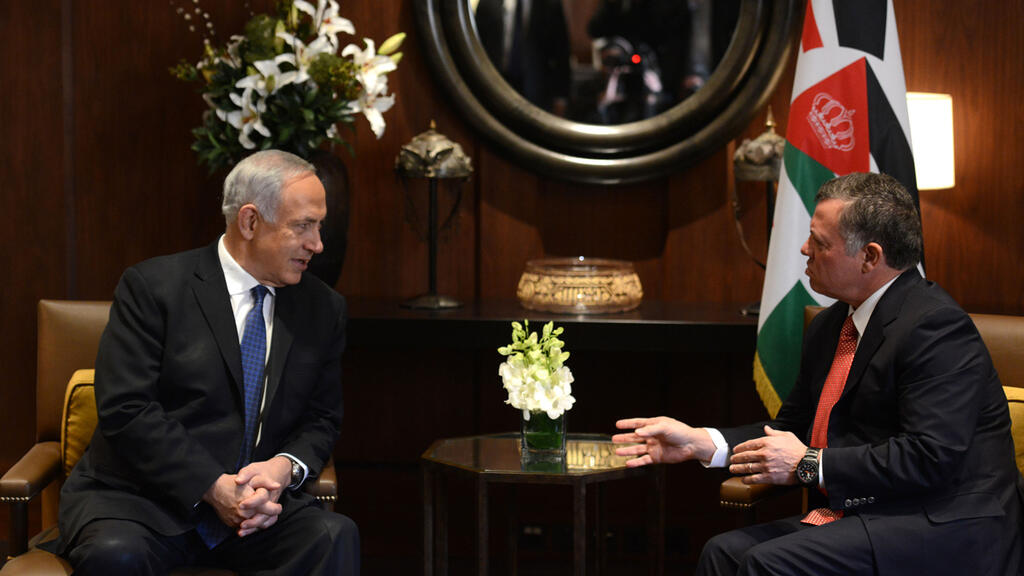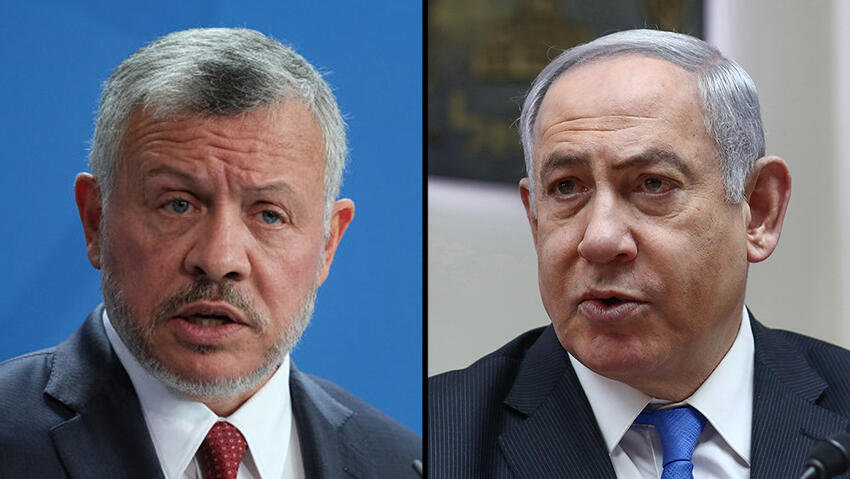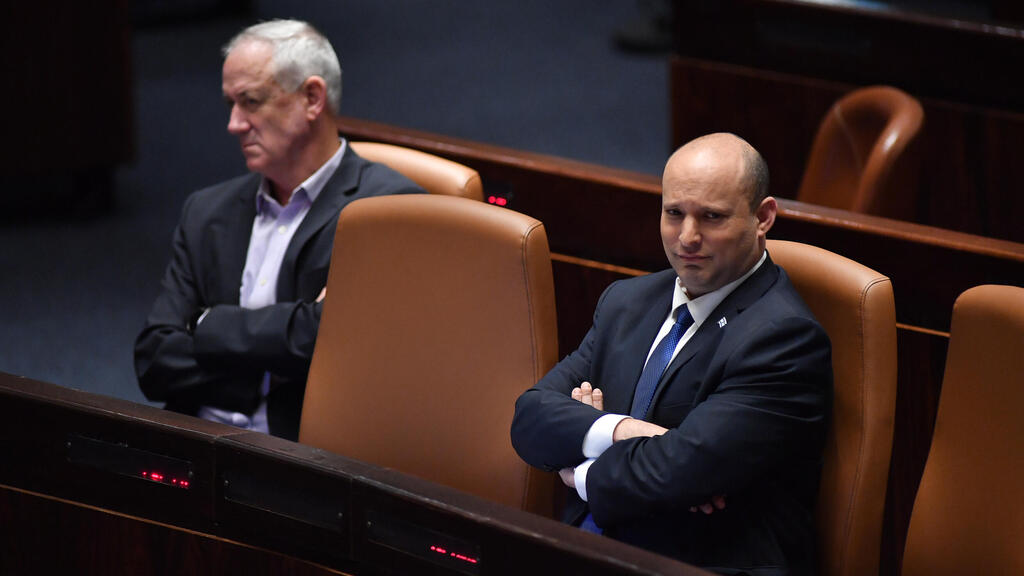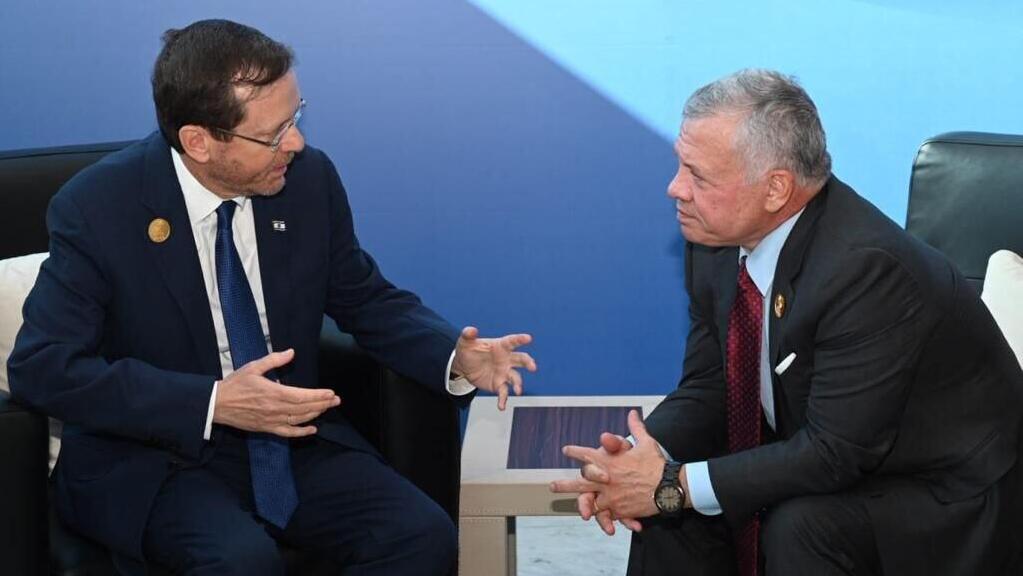Getting your Trinity Audio player ready...
Jordanian King Abdullah al-Hussein II spoke on the phone with Likud leader Benjamin Netanyahu on Monday and congratulated him on his win in the Israeli elections, the prime minister-designate's office said.
Relations between Netanyahu and al-Hussein were strenuous during the Israeli leader's previous term and the two haven't spoken to each other in years. Netanyahu's return to power raises concerns in the Hashemite Kingdom about the policies of his emerging nationalist government.
The outgoing government has managed to mend fences with the Jordanian monarch over the past year and a half, but talks with Jordanian officials reveal Amman's concerns that all progress made so far could be rolled back after the inauguration of the new government.
The statement did not specify the details of the conversation between the two, which is the first time the two spoke since their last meeting in 2018.
Israel-Jordan relations have known ebbs and flows during Netanyahu’s time in power. One of the low points came in March 2021 when Netanyahu had to cancel a much-publicized trip to the United Arab Emirates after Jordan stalled on authorizing his flight path over the kingdom.
Amman's refusal to authorize the trip came in response to the cancelation of a visit by the Jordanian crown prince to the Temple Mount following disagreements between Israel and Jordan on security arrangements. As a result, Netanyahu prohibited Jordanian flights from using Israeli airspace.
Another flashpoint in ties between the two countries was the 2017 killing of two Jordanian nationals by an Israeli embassy security guard in Amman after one of them stabbed him with a screwdriver.
4 View gallery


King Abdullah al-Hussein II and Benjamin Netanyahu meet in Amman
(Photo: Kobe Gideon, GPO)
The incident caused a diplomatic fallout between the neighboring nations. Jordanian authorities demanded the Israeli security guard be investigated, despite the Vienna Convention on Diplomatic Relations granting immunity to workers of foreign mission workers, and did not allow him to return to Israel.
As a result of tensions, Israeli embassy workers were instructed to remain within the embassy. Then-Shin Bet director Nadav Argaman traveled to Amman in a bid to deescalate the situation.
Netanyahu received the security guard back in Israel in a highly-publicized event at the Prime Minister’s office, which wasn’t received well in Amman.
Just a few days beforehand, a terrorist attack near the entrance to the Temple Mount in Jerusalem led Israeli authorities to close the sensitive site for two days and place metal detectors at the entrance.
Jordan, which has long held the role of the custodian of Muslim holy sites at the Temple Mount, was displeased with the move and conditioned the security guard's return to Israel on the removal of the metal detectors, to which Israel obliged.
Following the incident, Netanyahu said Israel is committed to upholding the status quo on the Temple Mount which only allows Muslims to pray at the site, which was home to both ancient Jewish temples, while non-Muslims are only allowed to visit the place.
“We welcome cooperation between Israeli authorities and the Jordanian waqf to ensure that visitors would show respect and the site’s holy status. We’ll work together to reduce tension, incitement and violence,” the Prime Minister's Office then said in a statement.
Relations began to thaw under the outgoing government after Abdullah met with former prime minister Naftali Bennett, Prime Minister Yair Lapid and Defense Minister Benny Gantz.
King Abdullah met with President Isaac Herzog last week on the sidelines of the UN climate summit in Egypt and expressed his concerns about potential changes to the status quo on the Temple Mount, especially since far-right firebrand Itamar Ben-Gvir is expected to become a senior minister in the incoming government. Abdullah urged Herzog and Israel to refrain from unilateral moves that could destabilize the situation.
Over the past year, the two countries have been hard at work on a joint water-for-energy deal under the auspices of the United Arab Emirates and the United States. The agreement will see desalinized water from Israel supplied to Jordan in exchange for electricity.
This marks the first time the Hashemite Kingdom signs off on a project featuring a signee nation of the Abraham Accords — a series of U.S.-brokered agreements that saw Israel normalize ties with several Muslim-majority countries.
A source at the UN climate summit told Ynet that the Jordanian delegation was hesitant to sign the project's memorandum of understanding before the results of the Israeli election became clear.
According to the source, Netanyahu had to issue a statement promising that his potential far-right coalition allies won't make any changes to the status quo on the Temple Mount.
“The issue of Al-Aqsa is one of the most sensitive points for the Jordanians, and is potentially explosive,” the source said, adding that the Jordanian delegation only agreed to sign the MOU after Netanyahu’s statement.




